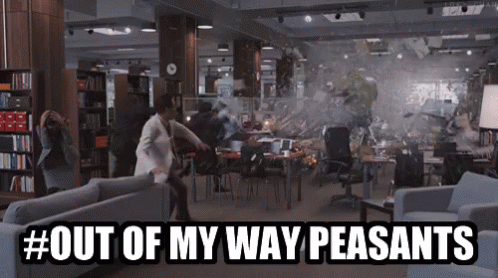When You Lose Your F*cking Mind: Your Lizard Brain
Maybe it's because I finally started reading Mark Manson's "Subtle Art of Not Giving a F*ck", but I decided I'd try how it feels to put it in a title. My new goal is to be like him kind of, with the female/person of color (POC)/counselor's edge.
 |
| me when I finish the book |
Anyways. So you're at work, minding your own business, having a grand morning, when another coworker decides to comment on your project/your classroom/your proposal/your technique.. something you've been working really hard on, that you're proud of, that you really actually care about-- maybe they were passive aggressive, maybe they were straight up critical. Your stomach drops, your heart starts a drumline, your fists tighten, and you see red. What. The. F*ckdidyoujustsay?!
If you could imagine your brain in freeze frame for a moment, you would see one part of your brain get pushed to the side while the other comes blazing into battle.
The angry green giant is your "lizard" or "reptilian" brain, and that's your auto functions' control center: your heart beating, your lungs expanding and deflating, your stomach turning, your poop moving. Conveniently it's also where your "Am I going to die?" mechanisms are; the brain was designed to use as little energy as possible to answer that question too - the first sign of danger should be the Only sign of danger... because the next one could obviously kill you.
When danger is not present, the reptilian brain is in charge of making sure that we play, care for our young, and mate so that there's more of us: key point being survival. When danger is present, as you probably know, we have 5 reactions: fight / flight / freeze / "play dead" or hide / submission.
 |
| fight and flight |
The peasants pushed aside by the raging hulk are the sorry peons working in your pre-frontal cortex: the part of your brain that's reading this right now, the part that knows a + b = c, the part that can politely tell your coworker who insulted your work to 'please explain what you mean so that I can improve my work' or to smile and nod and walk away before you tell them to go f*ck themselves.
For all of its amazing qualities like running our hearts and lungs and bowels, the lizard brain cannot tell time. Like at all. Now is now and that is it. This is why trauma causes us to experience it over and over again as though it's happening right now - and, by the way, trauma is anything that has caused a rift in your values or image of what people can be, not just something violent or scary. If you've ever gotten intensely angry at someone for something that has built up over the course of years of your friendship and finally bubbles into extended periods of silence or raging shouting matches - or you feel like blowing up at a coworker whose opinion in reality has nothing to do with your ability or expertise... congrats friend, you have a degree of trauma! Just like the rest of us.
The other thing about the lizard brain: can't do language good. If you could see my life in the day of a school counselor, you'd see this all the time. Kids who are upset are crying, screaming, hitting, kicking, running, hiding, standing still with their arms glued to the desk, repeating perhaps one phrase, clinging to it for life. Pretty much able to do everything except have a logical conversation about why another kid holding the crayon they want is not a crisis of life and death.
Part of my joyful task is teaching them (but especially their teachers) that they're in lizard brain mode. In order to regain their "smart" brain, they have to tend to their survival needs first. AKA Ms. T soothing their feels through 1) putting them in a safe, calm environment; 2) recognizing how they appear and feel right now ("I can tell that you're upset right now," "I see that you weren't trying to hurt anyone," "you're so angry right now"); 3) giving them clear directives such as "breathe with me" or "we are going to wait here for 5 minutes" or "give me the stick".
Once your lizard brain senses safety, the smart brain comes back online. Then, and only then, can you speak to someone about what happened and what they can do better.
You might not think that your coworker's comment is a matter of life and death, but your brain sure does. They've threatened something that is important to you, probably on multiple levels: 1) your value as a good ___er/___ist, whatever work you're doing; 2) your job is your source of income and therefore your source of everything you need in life; 3) you as a person, living in this world, have some sense of honor and your identity as a human being could be being threatened by Joe from marketing. (Sorry marketing for using you)
So, the next time your lizard brain takes over, follow my magical 3-step process:
1) Focus on Taking Deep Breaths and Being a Body.
The focus here should be to bring yourself back into your body. Cross your arms, grip your hands, hold your face, but focus on the feeling of your skin, your feet touching the ground, your butt against a chair, your face into a pillow, the air against your face. When you get mad, your body and your brain disconnect. Autopilot takes over, you want to get back in the driver's seat and fast. Focusing your attention on your body is like pressing the power button on your computer when everything is freezing and loading slowly - it shuts everything else down.
2) Acknowledge Your Own Pain.
This is key and very difficult at first, but trust me it does get easier with practice. What works for me is talking to myself, you may have your own way. Telling myself, "I'm upset, I'm anxious, I'm frustrated right now" is a good way to start - it seems so basic, but remember 70% of us can't identify a feeling when we are feeling it. So bring yourself into the 30% by practicing! Even "positive" or happy feelings. Practice on those first, it'll be easier and it'll inform you when you're upset too, because you'll know your values and what's important to you.. which is what later upsets you anyways, right?
Connecting that feeling to your beliefs such as: "I feel hurt and discouraged that my coworker would suggest my project won't go over well with my supervisor. I've worked really hard at it. I can't afford any more setbacks. I am afraid that I'll work really hard for nothing. I'm afraid this means I'm worthless." -- That's the heavy stuff we pay the big bucks in therapy for. This whole major emotional uncovering of layers takes some time and skill (sometimes years and years of practice) to do on your own, which is why many of us need a friend's or a therapist's perspective to help us connect the dots.
3) Then, and Only Then: Problem Solve.
We work ourselves into anxieties and further complications when we are trying to jump into solutions before we've done steps 1 and 2, so I really really really encourage everyone to work on those first.
I took the language of "lizard" vs. "smart" brain from this video that I also think will be useful for the kiddos to watch.. or for me to just do it myself. Thanks again for reading everyone! You really are giving me new purpose in life, so thank you so much!!
 |
| actual footage of my kids at school |
Once your lizard brain senses safety, the smart brain comes back online. Then, and only then, can you speak to someone about what happened and what they can do better.
You might not think that your coworker's comment is a matter of life and death, but your brain sure does. They've threatened something that is important to you, probably on multiple levels: 1) your value as a good ___er/___ist, whatever work you're doing; 2) your job is your source of income and therefore your source of everything you need in life; 3) you as a person, living in this world, have some sense of honor and your identity as a human being could be being threatened by Joe from marketing. (Sorry marketing for using you)
So, the next time your lizard brain takes over, follow my magical 3-step process:
1) Focus on Taking Deep Breaths and Being a Body.
The focus here should be to bring yourself back into your body. Cross your arms, grip your hands, hold your face, but focus on the feeling of your skin, your feet touching the ground, your butt against a chair, your face into a pillow, the air against your face. When you get mad, your body and your brain disconnect. Autopilot takes over, you want to get back in the driver's seat and fast. Focusing your attention on your body is like pressing the power button on your computer when everything is freezing and loading slowly - it shuts everything else down.
 |
| also applies for Tuesday |
This is key and very difficult at first, but trust me it does get easier with practice. What works for me is talking to myself, you may have your own way. Telling myself, "I'm upset, I'm anxious, I'm frustrated right now" is a good way to start - it seems so basic, but remember 70% of us can't identify a feeling when we are feeling it. So bring yourself into the 30% by practicing! Even "positive" or happy feelings. Practice on those first, it'll be easier and it'll inform you when you're upset too, because you'll know your values and what's important to you.. which is what later upsets you anyways, right?
Connecting that feeling to your beliefs such as: "I feel hurt and discouraged that my coworker would suggest my project won't go over well with my supervisor. I've worked really hard at it. I can't afford any more setbacks. I am afraid that I'll work really hard for nothing. I'm afraid this means I'm worthless." -- That's the heavy stuff we pay the big bucks in therapy for. This whole major emotional uncovering of layers takes some time and skill (sometimes years and years of practice) to do on your own, which is why many of us need a friend's or a therapist's perspective to help us connect the dots.
3) Then, and Only Then: Problem Solve.
We work ourselves into anxieties and further complications when we are trying to jump into solutions before we've done steps 1 and 2, so I really really really encourage everyone to work on those first.











Comments
Post a Comment